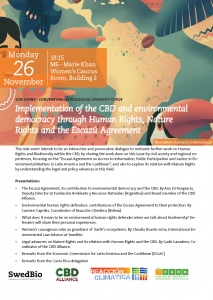SwedBio related event list
Rethinking Biodiversity Governance for Transformational Change
Date – Wednesday 21 November
Time – 08:45-19:00
Location – Rio Conventions Pavilion
Organisers – PBL Netherlands Environmental Assessment Agency, Sciences Po, SwedBio at Stockholm Resilience Centre
About
Consider how biodiversity governance can become transformative, and where CBD can build on its achievements.
SwedBio Contact: Tristan Tyrrell
6th Global Biodiversity Summit of Local and Subnational Governments
Date – 23-24 November
Organisers – ICLEI Cities Biodiversity Center, SCBD, Network of Regional Governments for Sustainable Development nrg4SD, South Sinai Governorate
About
The 6th Global Biodiversity Summit of Local and Subnational Governments will gather governors, mayors and other subnational government leaders from around the world to engage directly with national leaders and their key stakeholders during the 14th Conference of the Parties of the Convention on Biological Diversity (CBD COP 14). Engagements will focus on city and state level actions to mainstream biodiversity solutions into the new global developmental framework. SwedBio will be chairing and presenting at two roundtable sessions during the High level segment of the Summit.
Biodiversity Law and Governance Day
Contributions of International Law and Governance to Mainstreaming Biodiversity
Date – Friday 23 November
Time – 08:30 – 18:00
Location – Sharm El Sheikh International Congress Center (SHICC), Building 2, El Wadi (Contact Group 6)
Organisers – Centre for International Sustainable Development Law (CISDL), the Lauterpacht Centre for International Law at the University of Cambridge (LCIL), the Swedish Environmental Protection Agency (SEPA), SwedBio and the UN Development Programme (UNDP).
About this event
Biodiversity Law and Governance Day (BLGD) brings together biodiversity law experts, experts from other legal branches including public law, tort law, financial law, international economic law as well as governance experts, COP delegates and policy practitioners to exchange knowledge and experiences. This year, it is held alongside the CBD COP14 in Sharm El-Sheikh, Egypt.
Main themes under discussion
Mainstreaming biodiversity in the sectors of energy and mining, infrastructure, manufacturing and processing, and health
- How can law and governance mechanisms assist in mainstreaming of biodiversity in these sectors?
- What is the role of environmental impact assessment and strategic environmental assessment?
The conclusion of the Strategic Plan 2011-2020 and Aichi Biodiversity Targets
- COP 15 in 2020 is expected to consider for adoption the post-2020 global biodiversity framework in the context of the 2050 Vision of the current Strategic Plan, and the 2030 Agenda for Sustainable Development and other relevant international processes.
- What can be learned from law and governance approaches that have been adopted to implement the current Strategic Plan?
- What should the role of law and governance be in the post-2020 framework?
The effectiveness of the Nagoya Protocol
- The Nagoya Protocol has been in force for nearly four years, and the Parties will undertake the first assessment and review of its effectiveness at COP-MOP 3.
- What lessons can be learned from national and regional implementation efforts?
- What will the impacts be of emerging technologies on the effectiveness of the Protocol?
Enhancing synergies between different biodiversity conventions and international organizations
- Many international treaties and processes are relevant to biodiversity and ecosystems.
- How can Parties to the CBD and international organizations improve cooperation so as to enhance synergies and address intersections between organizations and regimes and biodiversity?
- What law and governance mechanisms can be used to improve coordination and cohesion?
The Nature and Culture Summit (22-24 Nov)
Panel 3 on Human rights for thriving indigenous peoples, local communities and healthy ecosystems
Date – Saturday 24 November
Time – 10:00 – onwards
Location – Multipurpose Room
Facilitators – SwedBio
About this event
The CBD recognizes the important contribution of indigenous peoples and local communities and their collective actions in conserving and protecting cultural and biological diversity.
This session will engage in a dialogue on how to best ensure indigenous peoples and local communities human rights to continue, and further develop, their customary sustainable practices for biodiversity and ecosystem governance, to the benefit of resilient biocultural systems and human wellbeing.
To achieve this, the session aims to contribute to co-development of a strategy on integrated sustainability and human-rights based approaches in the development of the post-2020 global biodiversity framework and the achievement of the SDGs. It also aims to build partnerships across indigenous peoples and local communities, Parties and international organizations with an emphasis on gender and youth, for the global recognition and implementation of the human right to a healthy environment.
Concrete tools and strategies that can contribute to understand and implement the cultural dimensions of the right to a safe, clean, healthy and sustainable environment, building on a diversity of contributions from indigenous peoples and local communities, women and youth will be presented. Key outcomes of multiactor dialogue processes that has engaged with indigenous peoples and local communities along with other actors, will be shared such the global dialogue on human rights and conservation in 2017 and the peer to peer dialogue on weaving together Sustainable Development Goal 16 and human rights in the post-2020 global biodiversity framework in 2018.
Key questions to discuss with the audience include:
- How are the global recognition of the human rights to a healthy and sustainable environment and biodiversity governance connected?
- How can human rights be integrated such as a cross-cutting dimension of all targets in the post-2020 global biodiversity framework?
- How can an enabling environment for indigenous peoples and local communities and other environmental rights defenders that are protecting their territories, biodiversity and knowledges be safeguarded, so they can exercise their rights and associated biocultural dimensions?
SwedBio contacts: Pernilla Malmer, Claudia Ituarte Lima
Local biodiversity actions towards implementing the subnational Plan of Action (2011-2020)
Date – Sunday 25 November
Time – 13:15
Event ID number – 2917
Location – M6 – Marie Khan Women’s Caucus Room, Building 2
Organisers – ICLEI Cities Biodiversity Center, SwedBio at the Stockholm Resilience Center (SRC), The International Union for Conservation of Nature (IUCN), The Secretariat of the Convention on Biological Diversity (SCBD)
About the event
Biodiversity and healthy, functioning ecosystems are essential for the well-being of urban communities and economies. The decisions that local and subnational governments take, can have major impacts on biodiversity and ecosystems. UN global population growth estimates indicate that by 2050 66% of the global population will live in urban areas. Cities and city-regions are on the cusp of major transformation and uniquely positioned to contribute to the achievement of global, regional and national biodiversity and sustainable development commitments and targets. Over the past decade successive CBD COP decisions have recognized local and subnational governments’ role in contributing to the Convention and its Strategic Plan.
To support the implementation of the Convention and its Strategic Plan, ICLEI, the SCBD, and other partners, such as the IUCN, SwedBio at the Stockholm Resilience Center have, since 2006, initiated and implemented various programs and initiatives to act on COP decisions to improve and enhance biodiversity mainstreaming and ecosystem management at the local and subnational level. As we move towards the post-2020 Global Biodiversity Framework, it is appropriate to reflect on and review progress in the implementation of the Convention and the Strategic Plan for Biodiversity 2011-2020 over the past decade.
This side event will show how the Plan of Action on Subnational Governments, Cities and Other Local Authorities for Biodiversity (COP 10 Decision X/22) has landed at the local level by showcasing a few cutting edge and transformative programs and projects implemented in cities and city regions across the world:
- Urban Natural Assets for Africa (UNA): Rivers for Life, implemented by ICLEI to support local governments in Africa in addressing daily challenges around protecting and revitalising their urban natural assets, particularly river systems, and aims to integrate nature-based solutions into land use planning for increased resilience;
- INTERACT Bio – integrated action on biodiversity, implemented by ICLEI in fast growing cities in Brazil, India and Tanzania to support all levels of government integrate their efforts for mainstreaming biodiversity and ecosystem services into core subnational government functions such as spatial planning, land-use management, local economic development and infrastructure design;
- The Local Action for Biodiversity (LAB) global biodiversity programme run by ICLEI Cities Biodiversity Center, in partnership with the IUCN, and a component of the CBD’s Global Partnership on Local and Subnational Action for Biodiversity, as well as the subsequent LAB projects implemented in Korea and South Africa;
- Local Protected Areas Project implemented by ICLEI in partnership with GIZ and the IUCN in Brazil, Colombia, Peru and Ecuador, to contribute to improving local governments’ capacity building and governance to conserve biodiversity through the effective and equitable management of protected areas and other conservation measures
- The Guidelines for an integrated approach in the development and implementation of National, Subnational and Local Biodiversity Strategies and Action Plans,
- The outcomes of successive Global Biodiversity Summits of Local and Subnational Governments, held in the margins of CBD COPs since 2008, and Urban Nature Forums Urban Nature Forums, convened as parallel events to the ICLEI World Congresses since 2006.
SwedBio contact: Ellika Hermansson Török
Date – Monday 26 November
Time – 18:15
Event ID number – 2957
Location – M6 – Marie Khan Women’s Caucus Room, Building 2
Organisers – Swedbio, Fundación Ambiente y Recursos Naturale (FARN), Reacción Climática (RC) CBD Alliance (CBDA)
About the event
This side event intends to be an interactive and provocative dialogue to motivate further work on Human Rights and Biodiversity within the CBD by sharing the work done on this issue by civil society and regional experiences, focusing on the “Escazú Agreement on Access to Information, Public Participation and Justice in Environmental Matters in Latin America and the Caribbean”; and also to explore its relation with Nature Rights by understanding the legal and policy advances in this field.
Presentations:
- The Escazú Agreement, its contribution to environmental democracy and the CBD. By Ana Di Pangracio,
Deputy Director at Fundación Ambiente y Recursos Naturales (Argentina) and Board member of the CBD
Alliance. - Environmental human rights defenders: contributions of the Escazu Agreement to their protection. By Carmen Capriles, Coordinator of Reacción Climática (Bolivia)
- What does it mean to be an environmental human rights defender when we talk about biodiversity? Defenderswill share their personal experiences.
- Women’s courageous roles as guardians of Earth’s ecosystems. By Claudia Ituarte-Lima, International Environmental Law Advisor at Swedbio
- Legal advances on Nature Rights and its relation with Human Rights and the CBD. By Gadir Lavadenz, Coordinator of the CBD Alliance.
- Remarks from the Economic Commission for Latin America and the Caribbean (ECLAC)
SwedBio contact: Claudia Ituarte Lima
Nature-based Solutions for Climate Change
Date – Monday 26 November
Time – 09:30 – 20:00
Location: Rio Conventions Pavilion
Organisers -Friends of EbA, SwedBio at the Stockholm Resilience Centre
About
Highlighting ecosystem-based approaches and other nature-based solutions to adapt to climate change, and discussing ways to implement the Voluntary Guidelines for the design and effective implementation of ecosystem-based approaches to climate change adaptation (Eba) and disaster risk reduction (Eco-DRR).
SwedBio Contact: Tristan Tyrrell

 Implementation of the CBD and envrionmental democracy through Human Rights, Nature RIghts and the Escazú Agreement
Implementation of the CBD and envrionmental democracy through Human Rights, Nature RIghts and the Escazú Agreement